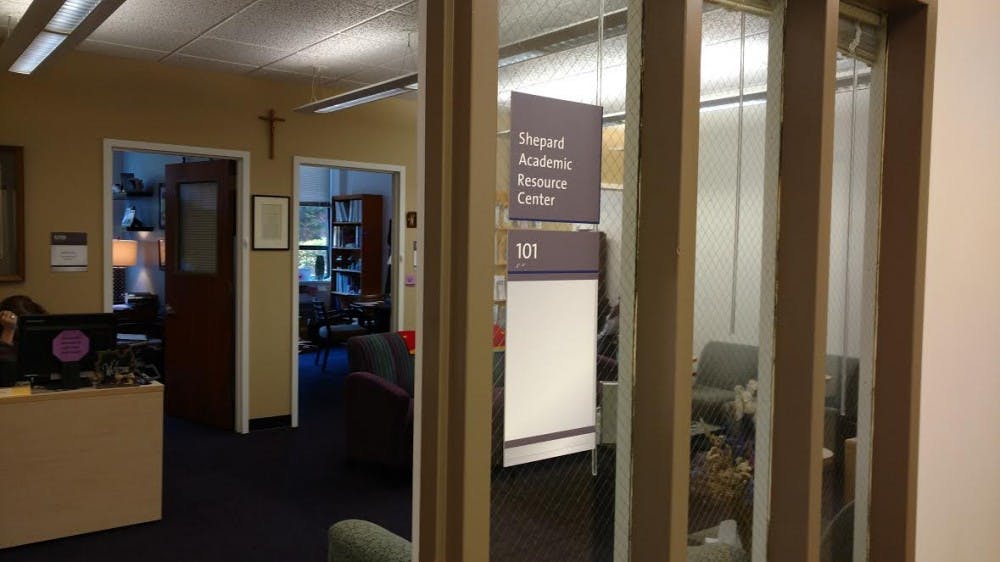“So...what’s your major?”
This unavoidable question follows every college student from application to diploma. Sometimes the answers come easy: nursing, pre-law, education. But what if a student doesn’t know what they want to do with the rest of their lives, let alone what they want to study?
Out of 965 total students, this year’s freshman class is composed of 10 percent undeclared majors -- that means one in 10 freshman who is asked this question won’t have an answer. Touted by UP admissions as the most diverse and academically talented freshman class, undeclared majors may feel pressured to catch up with those students who have a clearer sense of their future plans.
They may bear the stigma of slackerdom but Matt Daily, the Program Manager for Special Populations and Learning Assistance for the Shepard Academic Resource Center, disagrees with the negative associations of being undeclared.
"I think people feel a lot of different emotions with the idea of being undeclared,” Daily stated. “There's a sense that maybe people perceive that they're undecided, and that they don't know what they want to do, and I don't think that’s true at all. I think there’s a lot of reasons to celebrate that.”
Daily, along with SARC Director Brenda Greiner and Assistant Director Kelly Carder, are largely responsible for guiding undeclared students through their first semester of college, a process that begins the summer before their freshman year with phone interviews.
These interviews gauge a new student’s academic interests, if they plan to study abroad and what extracurriculars they’d like to explore. The SARC uses this information to sculpt each freshman’s fall schedule, to place them in appropriate Orientation and workshop groups and to register them for a core course with other undeclared students.
These advisers offer drop-in hours for students to come in and discuss their concerns.
Kaity Sullivan, a sophomore organizational communications major with a double minor in math and fine arts, said that she used the SARC when she felt particularly stressed out as an undeclared freshman. Sullivan had been concerned that coming in as an undeclared major was a poor choice, but Carder assuaged her fears.
“She was like, ‘No, it's all about the timing of when you declare,’” Sullivan said. “If you declare too late then, yeah, it wasn’t a good option for you because you didn’t have a clear enough mindset. I went to Kelly a few times and she didn’t push me, which was nice. (She didn’t tell me) this is what you should do … I came to her with my thoughts and my hopes and she really helped me.”
Carder helped Sullivan craft potential schedules for her major interests and listened to her concerns.
The Career Center is another on-campus resource offering help to those who are unsure.
Mary Sullivan, a junior history major, remembers going to a Career Center workshop as an undecided freshman.
“It was really helpful,” Mary Sullivan said. “The biggest thing I remember was the settling attitude, it relaxed me a lot, like it was going to be okay.”
The Career Center helps guide students toward their academic interests and potential careers. They offer access to the ONET, an online career aptitude test whose results are the jobs you’re most compatible with. A student can then schedule a meeting with a career adviser to discuss their results and how their academic interests might connect.
The Center also has daily “express advising”: 15 minute meeting slots with career advisers on a first-come-first-served basis for students who wish to discuss 4-year plans and future career paths.
Each college within the University also includes an advising suite for students (undeclared or otherwise) who have questions about their academic paths, future careers and other opportunities available at UP.
The College of Arts and Sciences — UP’s largest and most diverse school — has an advising suite in Buckley Center 216 that houses the Associate Dean of CAS, three academic counselors and an academic internship coordinator.
Tamar More and Craig Swinyard, both former departmental advisers for undeclared students, suggest turning to more unconventional services: The Moreau Center for volunteering opportunities, various clubs and campus research positions. All three options offer various opportunities for students to experience what it could be like in their potential field, as well as other fields they may not have considered.
Previously undeclared students say that coming in undecided gave them the freedom to explore their interests and experience new things.
“I hear about all these undeclared students and I just want them to know that it’s okay,” Mary Sullivan said.
Kaity Sullivan acknowledged that even after declaring, students may still feel some uncertainty about their decisions, as she did.
“Even though you don't feel like it's exactly what you want, you should choose what's best for you,” Kaity Sullivan said. “It's not always going to be super certain, I have to keep telling myself that."
Overall, advisers, upperclassmen and administrators alike advise undeclared majors to talk to people - students who were once undeclared, peers involved in similar academic or extracurricular interests and people who have had different experiences than yours are some of the most valuable resources there are.
They suggest that all students keep an open mind and be unafraid of challenges and uncertainty.








